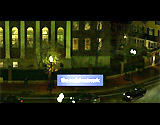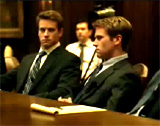
|
Greatest Courtroom Dramas 2010s |
(chronological by film title) Introduction | 1920s-1930s | 1940s | 1950s | 1960s | 1970s | 1980s | 1990s | 2000s | 2010s |
(chronological by title) |
||
| Film Title/Year/Director/Length/Studio, Academy Awards, Brief Description | ||

|
The Conspirator (2010) This preachy, slow-moving, deliberate and wordy biographical historical period drama was the post-Civil war story of Southern, Catholic, widowed, and stoic-willed Mary Surratt (Robin Wright), the only female co-conspirator charged in the Abraham Lincoln assassination in 1865 - in addition to her, seven other men were arrested and brought to trial. She was the manager of a boarding house where it was alleged that plans of various confederates, including John Wilkes Booth, were hatched to kill leading members of the US government. Novice but ambitious 27 year-old lawyer and Union war hero Frederick Aiken (James McAvoy) reluctantly agreed to defend her in a military tribunal courtroom - on charges that she was guilty by association. The idea was to force the only remaining conspirator, her son John (Johnny Simmons), who had fled before the assassination and was in hiding, to give himself up and save his mother's life. Verdict: Aiken defended Mary's innocence when she was prejudged by almost everyone, including zealous Secretary of War Edwin M. Stanton (Kevin Kline): ("If John Surratt was part of this conspiracy, I pray that he receives every punishment known to man. But if his mother can be convicted on such insufficient evidence, I tell you, none of you are safe. Members of the commission, do not permit this injustice to Mary Surratt by sacrificing our sacred rights out of revenge. Too many of us have laid down our lives to preserve them"). He persuasively argued that Mary was innocent and not directly involved. In his closing statement, Aiken stated: "For the lawyer as well as the soldier, there is an equally imperative command. That duty is to shelter from injustice the innocent, to protect the weak from oppression, and when necessity demands, to rally to the defense of those being wronged." After a heavy-handed kangaroo court-trial led by chief prosecutor Joseph Holt (Danny Huston) and biased tribunal head Gen. David Hunter (Colm Meaney), Mary Surrat was hanged with three others - and became the first woman to be executed by the US federal government. Ironically, her son John, who was put on trial 16 months later, was the only one to be exonerated by a hung jury. |
  
|

|
The Social Network (2010) Aaron Sorkin's Oscar-winning screenplay was a cautionary tale about the genius founding of a social media site named Facebook, and the subsequent betrayals of loyalties and accusatory lawsuits. It began with backstory about mean-spirited, 19 year-old Harvard University student and techie nerd Mark Zuckerberg (Jesse Eisenberg), whose initial efforts at social media (after being socially-rejected and dumped by his girlfriend Erica Albright (Rooney Mara)) included the creation of Fashmash - a website to easily rate photographs of students. However, he had illegally hacked into photo files of female Harvard undergrads. Soon after, the site's popularity was recognized by fellow students (and twins), Cameron and Tyler Winklevosses (Armie Hammer) (known as The Winklevi) and their business partner Divya Narendra (Max Minghella), who suggested another version of a campus 'social network' in the guise of a computer dating service - the germinal idea for Facebook. With guidance and support from Napster founder Sean Parker (Justin Timberlake), Zuckerberg succeeded in going on his own and taking Facebook to Silicon Valley's venture capitalists. Verdict: Interwoven in the Rashomon-like flashbacks were the conflicting courtroom testimonies, depositions and lawsuits brought against Zuckerberg by the Winklevosses who claimed plagiarism of their original idea, and his Brazilian student and business planner friend Eduardo Saverin's (Andrew Garfield) claims that his share was diluted or diminished and he was ultimately cut out. As a result of successful lawsuits and settlements, the Winklevosses received $65 million, and Saverin's name was restored as co-founder. |
    
|

|
The Lincoln Lawyer (2011) This noirish legal thriller was adapted from Michael Connelly's best-selling book. The title character was semi-corrupt Mickey "Mick" Haller (Matthew McConaughey), a sleazy, rakish, hustling defense attorney who conducted his LA-based business from the back-seat of a chauffeured black, aging Lincoln Continental (license plate - NTGUILTY). He had a well-deserved reputation as a hard-drinking lawyer who often helped seedy clients, low-lifes and other criminals to be freed. In the film's main case, Haller represented Louis Roulet (Ryan Phillippe), a smirking, spoiled 32 year-old Beverly Hills playboy and real estate broker, to defend him against charges of attempted rape and assault-murder of prostitute Regina "Reggie" Campo (Margarita Levieva). In a talkative courtroom trial, Haller faced off against prosecutor Ted Minton (Josh Lucas), whose assistant was Mick's divorced ex-wife Maggie McPherson (Marisa Tomei). Roulet was supported by his creepy socialite mom Mary Windsor (Frances Fisher), a rich real estate mogul. Verdict: There were unreliable witnesses (e.g., jailhouse snitch DJ Corliss (Shea Whigham)), and charges were ultimately dismissed against Roulet in the Campo case, but the testimony revealed numerous other twisting developments. Roulet was actually guilty of a previous similar crime - the murder of a prostitute named Donna Renteria. The killing had been falsely blamed on Jesus Martinez (Michael Pena) who was sent to San Quentin after Haller convinced his client to plead guilty to avoid the death penalty. Martinez was freed from prison, and Roulet was again charged with Donna Renteria's murder, and the DA sought the death penalty. In addition, Mary Windsor admitted to killing Mick's own shaggy long-haired investigator Frank Levin (William H. Macy), using Mick's own antique gun, to protect her son. When Haller was shot and wounded by her, he shot back and killed her. |
  
|

|
Devil's Knot (2013) Based upon a true story, this low-key biographical drama was based upon Mara Leveritt's 2002 book Devil's Knot: The True Story of the West Memphis Three - reminiscent of Arthur Miller's The Crucible and the Salem Witch Trials. It was about a shocking case in 1993 involving three teenagers who was charged with the brutal murder of three eight year-old schoolboys. One of the accused faced the death penalty (for charges of castration) and two faced life imprisonment. The three teens, who became known as The West Memphis Three were: Damien Echols (James Hamrick), Jason Baldwin (Seth Meriwether), and mildly-retarded Jessie Misskelley, Jr. (Kristopher Higgins). The dead included Stevie Branch (Jet Jurgensmeyer), Chris Byers (Brandon Spink), and Michael Moore (Paul Boardman Jr.). The bodies of the three victims were found naked, partially submerged and hog-tied/bound in a creek-bed. During the witch-hunt for the perpetrators of the triple homicide, there were suspicions of satanic worship and demonic rituals. Its tagline was: "They say the crimes were satanic. The truth may be scarier." In West Memphis, Arkansas, investigator and pro-bono defense attorney Ron Lax (Colin Firth) attempted to stand up to wild finger pointing and erroneous accusations when he took on the one-sided case in a sensational trial. Tough, but grief-stricken, angry Southerner Pam Hobbs (Reese Witherspoon), the mother of Stevie, was initially convinced of the accused's guilt, but then began to change her point of view. Verdict: The three teens were arrested, charged and convicted of capital murder. However, the only evidence against them was circumstantial (Echols was a self-labeled Wiccan, they were heavy metal enthusiasts and wore dark clothing, etc.). Problems with the case included a forced or coerced unreliable confession (of Misskelley) after bullying by law enforcement, perjured witnesses, a biased judge, delays in the prosecution providing evidence to the defense, and the fact that the case was tried in a prejudicial atmosphere of Arkansas. After a reexamination of the evidence and new DNA tests, it was determined that Stevie Branch's stepfather Terry Hobbs (Alessandro Nivola) was involved, although appeals were rejected. In 2011, the three defendants were released after taking the Alford Plea. |
  
|

|
The Judge (2014) This lengthy family melodrama was about the relationship between a callous, big-city, workaholic lawyer for wealthy clients, and his father - an elderly, stubbornly principled, local small-town jurist. In the midst of a divorce, successful but unethical Chicago defense attorney Henry "Hank" Palmer (Robert Downey, Jr.) was summoned to return to his childhood hometown in Carlinville, Indiana for the funeral of his recently-deceased mother. His dysfunctional family included his estranged 72 year-old father, still-practicing Judge Joseph Palmer (Robert Duvall), and two brothers: his younger autistic brother Dale (Jeremy Strong) always seen with a movie camera, and his older brother and tire shop owner Glen (Vincent D'Onofrio). After the service and during his departure at the airport, Hank was asked to return home to his father, thought to be in the early stages of memory loss (due to cancer chemotherapy treatments), who was implicated in a DUI-hit-and-run incident that took the life of bicycle-riding Mark Blackwell (Mark Kiely). The victim was formerly convicted by Judge Palmer to a twenty-year term in prison for killing his teenaged girlfriend, and had just been recently released. Vengeful out-of-town Prosecutor Dwight Dickham (Billy Bob Thornton) wished that the defendant would be found guilty of first-degree murder, due to his own prejudices and previous personal run-ins with the Judge. The Judge hired local inexperienced attorney C.P. Kennedy (Dax Shepard) to defend him, rather than his own son Hank, and the case was presided over by Judge Warren (Ken Howard). Verdict: During the trial phase after Hank was drawn into the case, the Judge - on the witness stand - demonstrated signs of his memory loss when he couldn't identiy his long-time bailiff, mentioned his chemotherapy treatments, and confessed that he didn't remember killing Blackwell, although he claimed he was glad that the white trash victim was dead. The jury ruled that the Judge was not guilty of murder, but he was guilty of voluntary manslaughter, and sentenced to four years in prison (although released early on parole due to a diagnosis of terminal cancer). In the emotional conclusion during a fishing trip, the Judge and son Hank came to a mutual understanding and reconciliation before the elderly Judge collapsed and died in the boat. |
   
|

|
Loving (2016, UK/US) A fictionalized romantic drama was the vehicle to present the famous, landmark US Supreme Court decision and ruling in a case known as Loving v. The Commonwealth of Virginia (1967) which invalidated state laws prohibiting interracial marriage. In 1958, Richard and Mildred (Jeter) Loving were arrested for violating Virginia's anti-miscegenation laws. They became the plaintiffs in a case lasting nine-years that stemmed from their secret marriage in 1958 in Washington DC, and their return to their home state of Virginia (the town of Central Point). Five weeks later, they were arrested in the middle of the night by the local Sheriff Brooks (Marton Csokas) and other authorities ("What are you doin' in there with that woman?"). They were immediately incarcerated for unlawful cohabitation as man and wife - the very-pregnant Mildred was detained a few extra days while Richard was released the next day. Although sentenced to one year in jail, both had their sentences suspended with a plea bargain on the condition that they depart from the state for a minimum of 25 years. Two pro-bono ACLU civil rights attorneys, Bernie Cohen (Nick Kroll) and Phil Hirschkop (Jon Bass), took their case (after the wife wrote to Attorney General Robert Kennedy) and argued the unconstitutionality of Virginia's Racial Integrity Act of 1924 that decreed the inter-racial couple couldn't live as a married couple in their home state (due to miscegenation laws). The two were forced to adapt to a new way of city life in Washington DC. The biographical legal film starred Joel Edgerton as Richard Loving, an inarticulate, reclusive Southern bricklayer and auto-shop worker, and Ruth Negga as his African-American wife Mildred. The most memorable sequence was late in the film when the Lovings' lawyer asked Richard what he wanted them to say on his behalf in front of the SC justices of the US. His response was simply: "Tell the judge I love my wife." Verdict: Without a melodramatic courtroom sequence (or Supreme Court hearing) and no major speeches, the simply-stated, no-frills film ended with a phone call to Mildred informing her of the verdict - the court had unanimously struck down the country's last segregation laws. |
   
|

|
If Beale Street Could Talk (2018) African-American James Baldwin's 1974 novel was the basis for this non-linear, historical romantic drama (with multiple flashbacks) about a wrongfully-incarcerated black man and the efforts of his dedicated lover (the first-person narrator) and family to prove his innocence. In early 1970s Harlem, teen sweethearts Clementine "Tish" Rivers (KiKi Layne) and artist-sculptor fiancee Alonzo "Fonny" Hunt (Stephan James) had already experienced racial harrassment from local police Officer Bell (Ed Skrein), and then later, Fonny was arrested by Bell and accused of brutally raping Victoria Rogers (Emily Rios), a native Puerto Rican. Fonny's legitimate alibi (that he was with Tish and his friend Daniel Carty (Brian Tyree Henry) at the time of the rape) was not deemed credible - because of Tish's presumed bias, and Daniel's previous grand-theft auto conviction (for a crime he didn't commit). The victim's identification of Fonny in a police line-up also doomed his fate. Tish announced to Fonny through a prison phone (behind glass) in a visiting room that Fonny was the father of her unborn child. Tish's mother Sharon (Regina King) attempted to intervene by tracking the traumatized Victoria back to Puerto Rico where she pleaded for her to change her testimony and exonerate Fonny. Her efforts were unsuccessful even though Victoria admitted that Officer Bell - with a personal vendetta - had coerced her into identifying Fonny in the line-up (the only black man). Verdict: With delays mounting during the trial stage, and difficult efforts to recruit funds for Fonny's legal representation by his lawyer Hayward (Finn Wittrock), Fonny eventually accepted a plea deal in order to eventually be released - even though there was a massive miscarriage of justice. |
 
|
Just Mercy (2019) This biographical (true-life) courtroom-drama was about the appeal of Walter "Johnny D" McMillian (Jamie Foxx), an African-American man on death-row, for his wrongful murder conviction (in 1987) for the 1986 murder of 18 year-old Ronda Morrison, a white dry-cleaning clerk. In 1989 in Alabama, he was defended by idealistic young Harvard law graduate Bryan Stevenson (Michael B. Jordan) who had founded the non-profit Equal Justice Initiative (to help provide pro bono legal representation for poor and under-represented black plaintiffs) with local white advocate Eva Ansley (Brie Larson) in Monroeville, Alabama. McMillian had been found guilty (with very flimsy evidence, and even with the suspect's solid alibi) solely due to the compromised and highly-suspect testimony of convicted felon Ralph Myers (Tim Blake Nelson), the key witness. At McMillian's day-and-a-half trial, the jury ignored multiple black witnesses who testified that McMillan was at a fish fry at the time of the crime. The acting prosecutor in the case, unsympathetic white-man Tommy Chapman (Rafe Spall), initially refused to listen to civil rights attorney Stevenson's defense of his client's case, and overt racial prejudice was brought to bear on the crusading defense attorney in the town (where the guilt-denying residents proudly asserted that Monroeville was where Harper Lee wrote To Kill a Mockingbird). The film proceeded through the customary filing of briefs, interviewing of witnesses, and prison visits. The case was amplified by the plights of two other convicted death-row inmates: PTSD-suffering, mentally-ill veteran Herbert Richardson (Rob Morgan), and McMillian's cellmate Anthony Ray Hinton (O'Shea Jackson Jr.). Eventually, Myers recanted his testimony, but the judge still wouldn't agree to a retrial. After McMillian's case received widespread media attention on CBS-TV's 60 Minutes, Stevenson appealed to the Supreme Court of Alabama, and was granted a retrial. Verdict: The history-making case was argued before the Alabama Supreme Court, where Chapman reluctantly joined Stevenson in successfully arguing that the charges should be dismissed entirely. McMillian was released from prison in 1993. McMillian's innocence was confirmed years later during a follow-up investigation, although the case was never completely solved. |
 
|
|